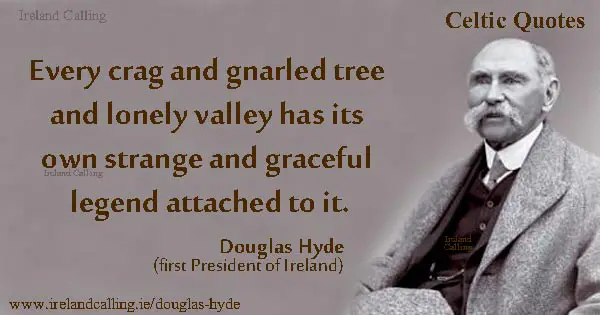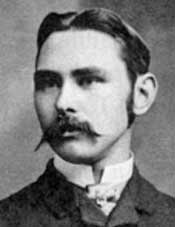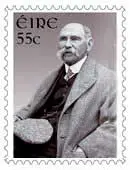Douglas Hyde was a gentle, scholarly man who became one of the most important figures in Irish history over the last 200 years. He became the first President of Ireland in 1937, but his real significance dates back to the 1880s when he began promoting the Irish language, culture and way of life.
Founder of the Gaelic League
Douglas Hyde quotes
This may seem a remote, academic concern divorced from everyday realities but it was to have a huge impact on Irish politics and played a major part in preparing the way for the 1916 Easter Rising, which eventually led to Irish independence.

Hyde was born on 17 January in 1860 near Castlerea in Co Roscommon. He was the son of a Protestant clergyman.
Ironically for a man who was to devote his life to promoting all things Irish, he was descended from an English family which had come to Ireland during the plantations in the reign of Queen Elizabeth I.
Hyde studied Irish folk tales and songs
Hyde had a happy childhood and enjoyed talking to the local, working people. At the time, about one quarter of the population still spoke Irish but the language was in steep decline.
The more Hyde listened to local speakers and studied their folk tales and songs, the more concerned he became at the thought the language might one day die out.

He began to learn Irish, and started to develop nationalist instincts that were to stay with him all his life.
In 1880, Hyde went to Dublin to attend Trinity College. He was appalled at how ‘English’ it seemed and how students and staff tended to denigrate Irish culture and achievements. He became disillusioned and stayed away from lectures for two years.
He continued to study alone, however, and such was his ability that he still excelled, winning several awards, particularly relating to literature.
He joined an organisation called the Contemporary Club which debated topical issues. This brought him into contact with leading nationalists including Michael Davitt, who founded the Land League, the leading Fenian John O’Leary and celebrities like the actress Maud Gonne and the poet W B Yeats.
A Plea for the Irish Language
While at Trinity, Hyde joined the Society for the Preservation of the Irish Language. He then went to write numerous poems in Irish, many with nationalist themes. He used the pen name, An Craoibhín Aoibhinn , which translates roughly as Delightful Little Branch.
In 1886, Hyde wrote an essay called, A Plea for the Irish Language, which was published in the Dublin University Review. It was the first of many pieces promoting Irish culture. It was followed by a collection of Irish folk tales called An Leabhar Sgeulaigheachta.

In the foreword, he made another plea for the preservation of Irish.
He wrote: “If we allow one of the finest and the richest languages in Europe, which, fifty years ago, was spoken by nearly four million Irishmen, to die out without a struggle, it will be an everlasting disgrace, and a blighting stigma upon our nationality.”
In 1890, Hyde published another book of Irish folklore called, Besides the Fires: a collection of Irish Gaelic folk stories. His reputation was well established and he was rubbing shoulders with the major literary figures of the day.
Hyde signed his marriage certificate in Irish
He founded the Irish Literary Society in London with W B Yeats in 1881, and the National Literary Society in Dublin the following year. He wrote a pamphlet called , The Necessity for the de-anglicising of the Irish nation.
It was a passionate work in which he attacked those who adopted English manners and habits, describing their behaviour as West Britonism.
Hyde tried to practise what he preached, so when he got married in Liverpool in 1893, he signed his name in Irish.
Douglas Hyde – founder of the Gaelic League. Read more
Douglas Hyde – first President of Ireland
Founder of the Gaelic League
Douglas Hyde quotes
More history articles
The Neolithics – first people to leave their mark on Ireland